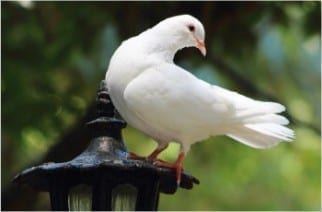Chana Weisberg has a magical voice. As she speaks, I feel myself relax, tune in and focus. Chana has the perfect voice for public speaking, which she does often, inspiring Jewish women around the world. Her message of empowerment for the Jewish woman is the centerpiece of all five of her books (including The Crown of Creation, Divine Whispers, The Feminine Soul, Tending the Garden, and Listening to the Whispers) and her work as chief editor for TheJewishWoman.org, the women’s branch of the Chabad website.
Chana was raised in Toronto, where her family has been a pillar of the Lubavitch community for years. Her father Harav Dovid Schochet is the rav and mara d’asra of Lubavitch Toronto, and her grandmother, encouraged by the Lubavitcher Rebbe, founded the very first chapter of N’shei Chabad, which now has hundreds of satellites worldwide. Chana’s house was always filled with people coming to her father to hear shiurim or to seek inspiration and advice. Her mother, meanwhile, worked hard to provide community members with the optimal environment for growth. These memories inspire her, Chana says; she recalls in particular the many Shabbosos her father stood speaking in shul. Her parents’ work shaped her own life goal: “To help people, to inspire them and to give them a deeper understanding of what they really are.” It would take Chana some time to discover the best way to pursue that goal, but she did have plenty of opportunities to hone her talents.
As the rabbi’s daughter, she was often called upon to give Shabbos shiurim to women three times her age. “I was so nervous the first few times,” Chana admits, “but my father encouraged me. He said, ‘Remember who you are. Act the part, and it will all be okay.’ And it was.” She attended Bais Yaakov of Toronto through seminary and taught there before starting work in outreach. All that time, Chana never envisioned herself as a public figure. “I didn’t have a picture; I just kind of evolved.” She recently moved to Lakewood for family reasons. Her first book, The Crown of Creation, was the result of a class she was teaching on Biblical women.
It was during the 1990s, and Chana was surprised when she looked for teaching resources to see how little was available at the time. Wanting to give her students a deeper perspective on the role of the Jewish woman, she turned to the meforshim and the deep chasidic dimension. As she did research, she took copious notes, which she realized could be compiled for a book. “I told my husband I was writing a book, and he said, ‘Mmm-hmm, that’s nice. Along with everything else?’” But with some creative time management, the book was ready a few months later. Despite the fact that Chana’s book was a novelty, she met some resistance in the Jewish publishing world. “They were like, ‘Who’s going to read this?’ One of them even told me, ‘It’s too profound for women.’” But they were wrong. “Women were thirsting to connect to people, to role models of the past in a very deep way.” The book was a success, and Chana’s writing career took off.
Four more books followed. Chana feels that one of the most important messages she wants to convey is that a woman has the capacity to find perspective not only in lofty ideals but in the mundane activities that fill their days. “When we see what we do for what it’s worth,” says Chana, “our lives are infinitely enriched… Every Jewish woman needs to know that she is incredibly powerful within her family and her surroundings. We don’t overwhelm our environment; we imbue it with a perspective, with a holiness and a certain beauty. We have the ability to change and transform it in our own unique way.” That message has reverberated in the hearts of women across the religious spectrum, including those who had held negative views of the Jewish woman until they came across Chana’s books.
One woman, a strong feminist, became frum after reading her work. Moved by the beautiful depiction of strong role models, it gave her a way to apply her feminism within the framework of Judaism. Alongside her success as a writer, Chana has also become a sought-after speaker—a role which surprises no one more than herself. A naturally reserved person, she was never inclined to seek out the spotlight, but women around the globe have invited her to come inspire them. “Every time I go on a speaking tour,” she says, “I’m supposed to be inspiring them, but they’re inspiring me.” In many of these foreign cities, Judaism is considered “a relic of the past,” but it is there that Chana can sometimes have the greatest impact. During a visit to Holland, she spoke to an audience of hundreds in Amsterdam, and the next day she spoke to about 20 women in The Hague’s small Jewish community.
She assumed the second event would end quickly, but the women kept her there for hours afterward, hanging onto her every word. “[These are] Jewish neshamos who are so thirsty and who are just drinking in this information. It’s incredible.” As if her plate weren’t full enough, a few years ago Chana took on the role of chief editor for TheJewishWoman.org, having worked for chabad.org for years.
She invested her talents in the site, building it with articles, videos and lessons on every topic from spirituality to marriage, parenting and kugel recipes. It is the largest Jewish women’s website in the world (chabad.org gets 37 million unique visitors yearly), and Chana has met readers from the unlikeliest places. “The other day, I got a message from a woman near the Arctic Circle. She said, ‘I can assure you that I am your northernmost reader. I wanted to thank you for being here with me, where I’m alone. You’re my source of inspiration.’” Messages like these, delivered both online and in person, are what keep Chana going. She believes she is doing the most important work a Jew can do.
During one of her trips, she had the opportunity to read a letter from the Frierdiker (previous) Rebbe to her grandfather, who was a rabbi in The Hague after World War II. In it, the Rebbe spoke of the children who had been hidden in nunneries to protect them from the Nazis and who were now stuck there, far away from a Jewish life. The Rebbe begged her grandfather to do whatever he could to save those children, “because every moment that they are in these foreign environments, their parents, in the afterlife, are in torment…” The experience shook Chana deeply. “To me, it represented what we all have to do. There are so many people in a foreign environment who don’t even realize they’re in a foreign environment, and they’re so eager to drink in some of the inspiration that we’re so fortunate to have grown up with. How can we not do whatever we can to share it?” With her writing, speaking and busy family life (she’s expecting her fourth grandchild any day), Chana has plenty to look forward to. But she leaves the planning up to the One in charge: “I just daven every day, ‘Give me the opportunity to do what You want me to do.’”





